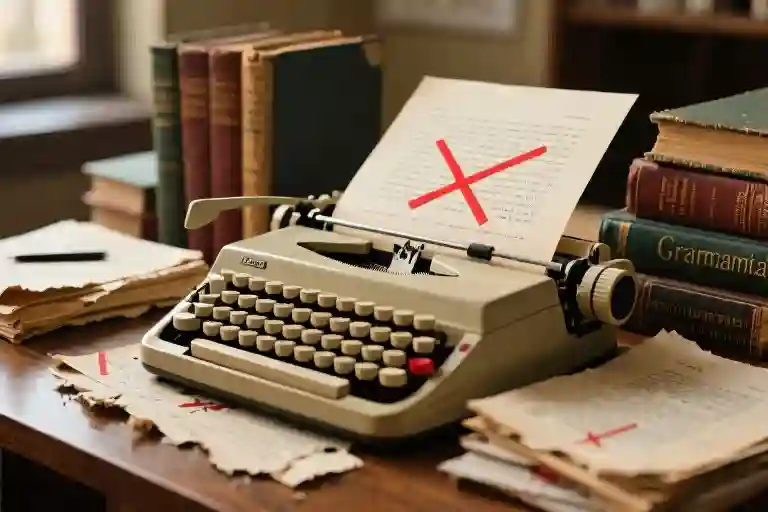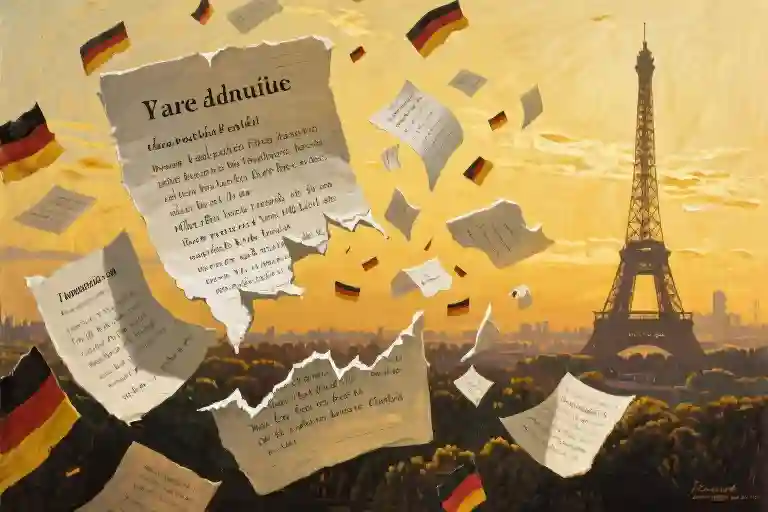The leather-bound journal feels strangely light in my hands now, its once-vibrant cover faded to the color of weak tea. As I carefully untie the ribbon that teenage-me thought was so sophisticated, a pressed four-leaf clover drifts onto my lap – the kind of magical find we’d ceremoniously label as ‘epic’ back in 2003. Flipping through these pages feels like decoding messages from a foreign civilization, one where ‘ROFL’ was peak humor and ‘BFF’ contracts were signed in glitter pens.
Certain entries make me pause at their linguistic time capsules: the way we earnestly described things as ‘random’ when we meant amusingly unexpected, or how ‘talk to the hand’ briefly masqueraded as legitimate discourse. These weren’t just personal slang – they were linguistic breadcrumbs marking cultural moments. Which makes me wonder: if our adolescent vocabulary can feel so antiquated after mere decades, what happens to words that vanish from the collective memory entirely?
Language, like my middle school fashion choices, constantly sheds its outdated layers. The Oxford English Dictionary retires about 1,000 words annually – not because they’re incorrect, but because they’ve become lexical ghosts. Consider how naturally we’ve stopped saying ‘videotape’ or ‘rewind,’ their meanings evaporating along with the cassette decks they described. Even seemingly permanent words can fade; the verb ‘to google’ may well follow ‘to xerox’ into trademark obsolescence.
This phenomenon goes beyond technological shifts. Our vocabulary reflects societal priorities in any given era. Victorian London employed thousands of ‘knocker-ups’ – human alarm clocks who tapped windows with long poles. The job title vanished when mechanical clocks became affordable, leaving only linguistic fossils in old newspapers. Similarly, medieval ‘gong farmers’ (a delightfully polite term for nightsoil collectors) disappeared with modern sanitation, though their earthy vocabulary lingers in historical records.
Scientific revolutions rewrite our dictionaries too. Early chemists sincerely debated ‘phlogiston,’ the hypothetical fire element they believed all combustible materials contained. The term became obsolete after oxygen’s discovery, though it left burn marks on scientific history. Social progress likewise retires vocabulary – consider how workplace terminology evolved from ‘typewriter girls’ to ‘administrative professionals.’
What’s fascinating isn’t just that words disappear, but how their departures reveal hidden patterns. Words tend to fade when:
- Their referents vanish (floppy disks, knocker-ups)
- New knowledge disproves concepts (phlogiston, miasma theory)
- Social sensitivities change (outdated medical or racial terms)
- Younger generations develop more efficient alternatives (texting abbreviations replacing formal letter conventions)
Yet some words demonstrate remarkable staying power. ‘Dial’ a phone? ‘Hang up’? These persist despite becoming technologically inaccurate. Perhaps because language isn’t just functional – it’s emotional. The words we retire aren’t failures; they’re stepping stones that helped us articulate the world as we understood it at the time. Like my cringe-worthy diary entries, they capture moments of linguistic growing pains, reminding us that communication, like people, is always evolving.
The Memory Drawer: When Words Become Time Capsules
That moment when you rediscover your childhood journal buried in an old shoebox—it’s like unearthing a linguistic artifact. The faded ink holds more than just cringe-worthy confessions; it preserves vocabulary fossils that time has rendered obsolete in your personal lexicon. Those words that once felt so natural now seem foreign, like reading someone else’s thoughts.
Consider the term ‘mix tape’ scribbled in your 1998 diary entry about your middle school crush. Today’s generation would need an explanation for this analog predecessor to Spotify playlists. Or the excited note about getting a ‘Walkman’ for your birthday—a word that now belongs in technology museums alongside ‘gramophone’ and ‘telegraph’.
Three particularly telling examples emerge from these personal language archives:
- ‘Rewind’ – That physical act of spinning cassette tapes backward has evaporated with digital streaming. The word persists metaphorically (‘let’s rewind that conversation’), but its original tactile meaning is disappearing.
- ‘Pager number’ – Found in a 1996 entry about sharing contact information. The rectangular devices and their associated vocabulary vanished almost overnight when mobile phones became ubiquitous.
- ‘Film roll’ – Your detailed account of waiting days to see vacation photos now reads like historical fiction in our instant Instagram era.
These personal language shifts mirror larger societal changes. Just as your diary shows words fading from individual memory, the collective vocabulary sheds terms when their real-world references disappear. The transition happens so gradually we rarely notice—until we stumble upon linguistic relics like ‘dial-up’ or ‘VCR’ and realize entire concepts have slipped into obsolescence.
What makes this personal-public connection fascinating is how it reveals language as a living archive. Your childhood journal doesn’t just record your growth; it documents the evolution of communication itself. Those awkward teenage entries preserve more than memories—they’re time capsules of how we once described our world, complete with vocabulary that future generations might need footnotes to understand.
This phenomenon extends beyond technology. Flipping through old pages, you might find forgotten expressions like ‘going steady’ (dating exclusively) or ‘far out’ (cool)—phrases that evaporated not because objects disappeared, but because social norms changed. The diary becomes an accidental linguist’s field guide, showing how even the most commonplace words have expiration dates we never consider when first writing them down.
The Vocabulary Museum: Linguistic Fossils in Display Cases
Stepping into this lexical museum feels like walking through time. Each exhibit tells a silent story of human progress, where words become artifacts of civilizations past. Let’s examine these linguistic fossils through four carefully curated galleries.
Technology Obsolete Wing
The first display case holds relics from our digital archaeology. Floppy disk sits prominently – that once-indispensable square of plastic that stored what we now keep in cloud folders. Remember struggling with ‘Insert Disk 2’ prompts? This term peaked in the 1990s before fading faster than its 1.44MB storage capacity became irrelevant.
Nearby rests videotape, its very name now puzzling to children who’ve only known streaming. The verb ‘to tape’ (as in recording shows) still lingers in some dialects, a ghost of its former self. These terms demonstrate how technological leaps can erase entire lexical categories within a generation.
Profession Extinction Hall
Moving to occupational archaeology, we encounter knocker-up, the human alarm clock of industrial Britain. These dawn patrol workers used long poles to tap on factory workers’ windows – a profession made obsolete by affordable timepieces. Their disappearance took with it related terms like ‘knocking-up stick’ and ‘wake-up rounds’.
The adjacent plaque honors ice cutter, the 19th-century workers who harvested frozen lakes before mechanical refrigeration. Terms like ‘ice harvest’ and ‘ice ticket’ melted away with this seasonal occupation. These cases show how economic shifts can freeze entire vocabularies out of existence.
Debunked Theory Archive
In our scientific wing, phlogiston stands as a cautionary tale. This hypothetical fire substance represented 17th-century chemistry’s best guess about combustion. When oxygen theory replaced it, dozens of related terms like ‘phlogisticated air’ and ‘dephlogistication’ became historical footnotes overnight. It’s a stark reminder that scientific revolutions can render entire lexicons obsolete.
Social Evolution Gallery
Our final exhibit features spinster, once a neutral term for unmarried women who spun yarn. As spinning wheels disappeared and social attitudes shifted, the word acquired its modern pejorative tone before fading from common use. Nearby, illegal (as in ‘illegal immigrant’) appears mid-transition – some style guides now recommend ‘undocumented’ as perceptions evolve.
These lexical artifacts collectively reveal a truth: vocabulary extinction follows civilization’s tectonic shifts. Each vanished word marks where technology, economy, science or society moved forward. As you leave this museum, consider what current words might someday appear here – will ‘hashtag’ or ‘selfie’ become the next linguistic fossils?
The Life Cycle of Language: From Birth to Silence
Words, like living organisms, follow a natural progression from vibrant usage to quiet obsolescence. Understanding how vocabulary fades from common use reveals fascinating patterns about human communication and cultural evolution. Three critical thresholds typically mark a word’s journey toward extinction in our collective lexicon.
The Three Tipping Points of Vocabulary Extinction
1. The Usage Cliff (Frequency <0.001%)
When a word appears in fewer than one per million words in contemporary texts, it crosses into endangered territory. Lexicographers track this through massive corpus analyses – imagine linguistic ecologists monitoring rare species. The once-common ‘pantaloons’ (a type of trousers) now lingers at 0.0003% frequency, kept alive mainly in historical novels.
2. Generational Transmission Breakdown
Vocabulary faces extinction when two consecutive generations stop naturally using terms. My grandmother’s ‘icebox’ became my father’s ‘refrigerator,’ then simply ‘fridge’ in my texts. This mirrors how ‘wireless’ (meaning radio) survived through WWII veterans but faded with baby boomers.
3. Professional Domain Evaporation
Specialized vocabularies can preserve words like specimens in formaldehyde. Medieval scribes’ ‘quire’ (24 sheets of paper) survives in bookbinding circles, while ‘apothecary’ persists nostalgically in pharmacy naming. But when industries modernize – as with ‘typesetter’ in publishing – their terminology often follows.
Case Studies in Linguistic Extinction
The tragicomic story of ‘gollywog’ demonstrates social perception shifts. Originally a 19th-century children’s book character, this term became socially radioactive by the 1980s. Meanwhile, ‘steamster’ (steam engine mechanic) vanished when diesel locomotives arrived, showing technology’s vocabulary impact.
Medical history provides striking examples. ‘Miasma theory’ terms like ‘night air’ disappeared when germ theory emerged, though interestingly, ‘malaria’ (bad air) kept its name while completely changing scientific meaning.
The Cryogenics of Language
Certain words achieve suspended animation through:
- Liturgical Preservation: ‘Thou/thee’ survive in religious contexts
- Nostalgia Marketing: ‘Haberdashery’ thrives in boutique naming
- Legal Fossilization: ‘Hereunto’ persists in contract language
Like seeds in the Svalbard Global Seed Vault, these terms remain viable for potential future use. Shakespeare’s ‘wherefore’ (meaning ‘why’) still understands us, even if we rarely speak back in kind.
This linguistic life cycle continues accelerating in our digital age. The words we type today may become tomorrow’s ‘floppy disks’ – remembered fondly but functionally obsolete. What currently common terms might your grandchildren need to Google?
The Social Microscope: Civilization’s Footprint in Vanishing Words
Language doesn’t just fade—it carries the fingerprints of human progress. Every obsolete word in our linguistic attic tells a story about how we’ve reinvented our world. Let’s examine three distinct layers where social transformation directly shaped our vocabulary.
Industrial Revolution: The Great Career Shift
The 19th century didn’t just change how we worked—it rewrote the dictionary of professions. Consider these casualties of mechanization:
- Knocker-up (1840s-1920s): This human alarm clock became obsolete not because people stopped waking early, but because spring-loaded alarm clocks became affordable for working-class households by 1900. The last professional knocker-up retired in 1973 in Manchester.
- Lamplighter (pre-1920s): Gas street lighting created this twilight profession, only for electric lights to eliminate it. London’s final lamplighter made his rounds in 1922, though some cities kept ceremonial positions for tourism.
What’s fascinating? These jobs didn’t just disappear—they fragmented into new specialties. The knocker-up’s timekeeping function evolved into modern scheduling roles, while lamplighters’ maintenance skills transferred to electrical engineering.
Digital Acceleration: The Tech Lexicon Time Crunch
Compare how long these terms remained relevant:
| Pre-digital Era | Lifespan | Digital Era | Lifespan |
|---|---|---|---|
| Phonograph | 100+ yrs | Floppy disk | 30 yrs |
| Telegraph | 80 yrs | CD-ROM | 15 yrs |
Notice the compression? Where industrial-age terms enjoyed generational staying power, digital vocabulary now refreshes at nearly biological speeds. The term ‘smartphone’ (2000) already feels dated compared to ‘AI assistant’ (2016). This acceleration mirrors how Moore’s Law transformed tech adoption cycles.
Social Awakenings: When Words Outgrow Their Meanings
Some words don’t vanish—they become linguistic landmines. Consider:
- Colored (pre-1960s): Once standard terminology, now recognized as offensive due to civil rights movements. The shift to ‘person of color’ reflects evolving identity politics.
- Hysteria (medical use until 1980): Derived from Greek for ‘wandering uterus,’ this diagnosis for women’s emotional distress was finally removed from diagnostic manuals after feminist critiques exposed its sexist origins.
These examples reveal language as society’s mirror. When we examine why certain words make us cringe today, we’re actually tracing moral progress. The speed of these changes has dramatically increased—where Victorian-era offensive terms took generations to phase out, modern problematic vocabulary can become taboo within years due to social media amplification.
The Ripple Effects You Might Miss
Beyond individual words, observe these subtle shifts:
- Verb Necrosis: Many occupation verbs died with their jobs. We no longer ‘dial’ phones or ‘film’ videos, yet these linguistic fossils persist metaphorically.
- Semantic Bleaching: Words like ‘awesome’ and ‘literally’ have lost their original punch through overuse—a side effect of digital communication’s rapid cycles.
- Hybrid Revival: Some ‘dead’ terms get reincarnated in new contexts. ‘Streaming’ originally described 19th-century textile manufacturing before its digital rebirth.
This linguistic archaeology shows that no word truly disappears—it either transforms or awaits rediscovery. Perhaps in another decade, today’s cutting-edge terms will join floppy disks in the lexical museum, making space for language that better captures our ever-evolving human experience.
The Lost & Found of Language: A Farewell to Forgotten Words
Reaching the end of our linguistic time travel, let’s pause to appreciate how these lexical artifacts reveal more than just dictionary definitions—they’re cultural fingerprints of human progress. The obsolete words we’ve explored form a peculiar archaeology of everyday life, where each forgotten term contains frozen moments of social history.
When Was the Last Time You Heard…?
Take a mental walk through your recent conversations. Did any unfamiliar words make you pause? Perhaps an elderly relative mentioned “icebox” instead of refrigerator, or a historical novel contained references to “steam lorries.” These verbal relics still linger at the edges of our language like faint echoes.
We’d love to hear about the most puzzling outdated word you’ve recently encountered. Was it:
- A childhood term your grandparents used that baffles your kids?
- A professional jargon from a bygone era you discovered in old documents?
- A technological term that now sounds quaint (“dial-up modem,” anyone?)
Share your findings with #LexicalFossils on social media—we’re building a crowdsourced museum of endangered vocabulary.
The Language Time Capsule Project
Let’s turn this exploration into an ongoing conversation. Starting this month, we’re launching a community initiative to:
- Document disappearing words through submitted examples
- Map regional variations in vocabulary obsolescence
- Preserve oral histories behind vanishing terms
Participation is simple: next time you encounter an archaic word—whether in vintage advertisements, yellowed letters, or family recipes—snap a photo and tag its story. Selected submissions will feature in our quarterly “Language Obituaries” digest.
Like a River Reshaping Its Banks
Language evolves like nature’s most powerful forces—sometimes through gradual erosion, other times through sudden upheavals. Those floppy disks and knocker-ups haven’t truly vanished; they’ve transformed into different forms, just as rivers change course while remaining waterways.
As we close this chapter, consider the words you use today that might puzzle future generations. Will “hashtag” sound as archaic as “telegram” does now? Does “cloud storage” have the same fate as “punch cards”? The beauty of language lies in this endless metamorphosis—a living system that grows as we do.
Final Thought: Every word ever spoken still ripples through time. Some create tsunamis that reshape coastlines; others become gentle lapping waves that barely reach shore. But none disappear without leaving traces in the sands of human connection.





